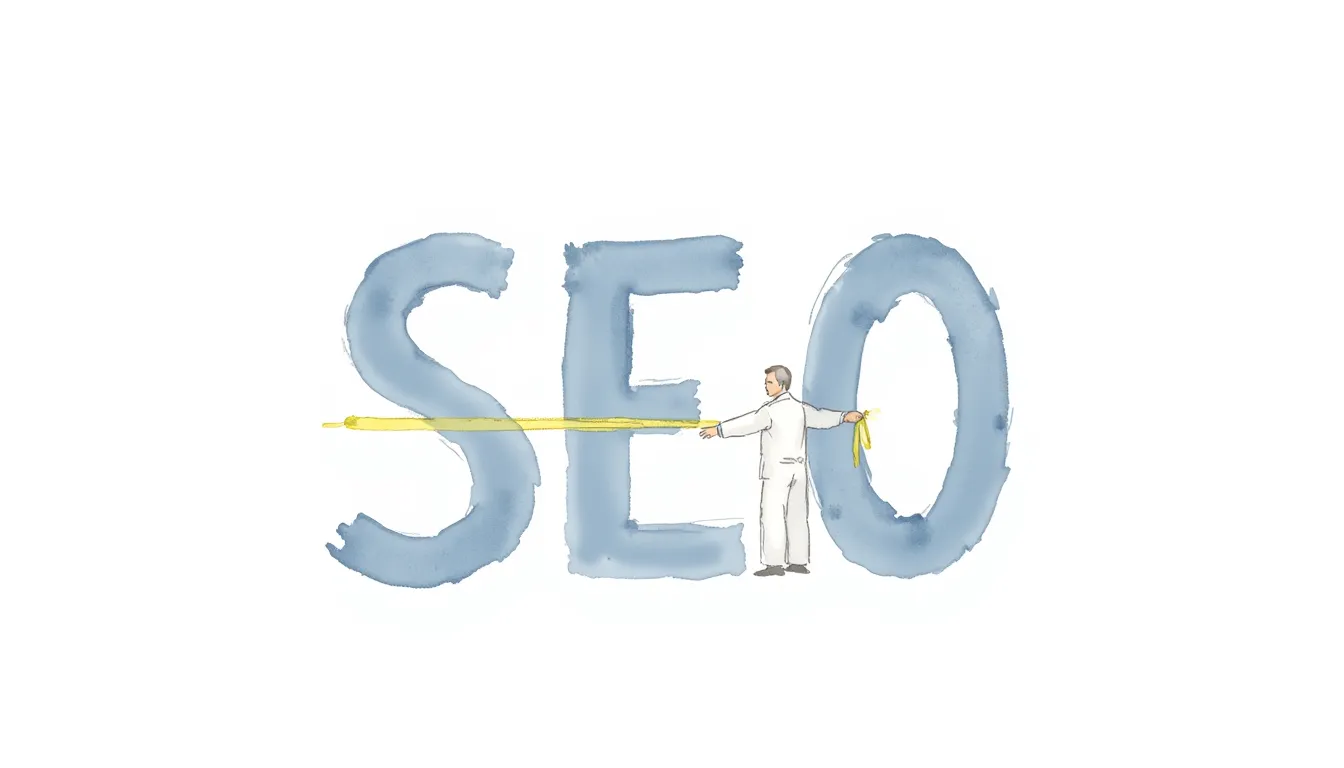Insurance agency SEO growth shown with colorful letters A, B, and C.

Nearly 87% of insurance buyers begin their coverage search online before contacting an agent. Yet, many well-established agencies stand by helplessly as tech-savvy competitors capture market share by appearing first in search results. This shift presents a critical challenge: agencies that built their reputation through traditional marketing now find their expertise invisible to prospects actively seeking coverage. In today’s competitive insurance landscape, mastering insurance SEO has become vital for survival and growth.
For insurance agency owners who understand the necessity of digital marketing but feel overwhelmed by its complexity, the solution lies in a systematic approach to insurance agency SEO. The ABC framework breaks down search engine optimization into three manageable components: Audience identification, Building your foundation, and Content creation. When paired with proper team training, this method transforms your online presence from invisible to indispensable.
Drawing on our experience helping agencies like yours grow from startups to multi-million-dollar operations, this guide provides actionable strategies that generate measurable results. Each component builds upon the last, creating a sustainable system for attracting qualified insurance leads while establishing your agency as the local authority.
Why SEO Matters More Than Ever for Insurance Agencies
Consumer behavior has fundamentally shifted from calling agencies directly to researching coverage options online, comparing quotes, and reading reviews before initiating contact. This behavioral change presents both challenges and opportunities for traditional agencies that are willing to adapt their marketing approach.
Consider the economics: while a Yellow Pages advertisement costs $1,200 monthly with declining readership, strategic SEO for insurance investments of $800 monthly typically generates three times more qualified leads. Unlike paid advertising, which stops producing results when spending ceases, insurance SEO builds cumulative value. Content created today continues generating leads for years, compounding your marketing investment. In contrast, while Google Ads can provide immediate visibility, they require ongoing investment and don’t contribute to long-term organic growth.
Local insurance marketing presents unique advantages. Insurance searches often have less competition than national terms, creating opportunities for agencies to dominate their geographic markets. Ranking high in search results builds credibility and positions your agency as the local authority, something particularly valuable in an industry built on trust and relationships.
The data supports this shift: agencies implementing a comprehensive SEO strategy report 40% increases in qualified leads within six months, with continued growth as their content library expands. More importantly, these leads often convert at higher rates because prospects have already researched their options and view top-ranking agencies as more credible.
A for Audience - Understanding Your Insurance Buyers

Successful insurance SEO begins with understanding exactly who searches for your services and how they express their needs online. Creating detailed buyer personas helps identify the specific keywords and phrases your ideal clients use when seeking coverage.
Consider “Business Owner Mike,” a 45-year-old entrepreneur who values expertise and comprehensive coverage. Mike searches differently than a 25-year-old first-time homeowner or a 60-year-old planning retirement. Understanding these distinctions guides your keyword research and content creation strategy.
Different insurance types generate distinct search patterns:
Auto insurance searches typically include: “best car insurance rates [city],” “car insurance after accident,” and “auto insurance discounts.” These prospects often prioritize cost but also seek responsive service during the claims process.
Life insurance searches focus on education: “term vs whole life insurance,” “life insurance calculator,” and “life insurance for young families.” These prospects need guidance through complex decisions with long-term implications.
Commercial insurance searches reflect business concerns: “workers comp requirements [state],” “professional liability insurance [industry],” and “small business insurance packages.” These prospects value expertise and comprehensive coverage over the lowest price.
Your target audience also searches for solutions to common frustrations: confusing policy language, long wait times, and impersonal service. Addressing these pain points in your content creates opportunities to differentiate your agency while capturing relevant search volume.
Effective audience research reveals not just what people search for, but why they search and what information influences their decisions. This understanding forms the foundation for all subsequent SEO efforts, helping to align your content with user search intent.
B is for Building Your SEO Foundation
Your SEO foundation consists of technical elements and local optimization factors that determine whether search engines can find, understand, and recommend your insurance websites. These fundamentals must be properly configured before content creation efforts can succeed.
Technical requirements include:
- Page load speed under three seconds (crucial for both user experience and search rankings)
- Mobile-responsive design that functions perfectly on smartphones and tablets
- Clear contact information is displayed prominently on every page
- Separate, detailed pages for each insurance type you offer
- Prominent display of your location and service areas
- Website design that prioritizes user experience and conversion optimization
Local SEO optimization is particularly critical for insurance agencies serving specific geographic markets. Start by claiming and optimizing your Google My Business profile with complete business information, high-quality photos, and regular posts about your services. Consistency is crucial: your business name, address, and phone number must be identical across all online directories.
Directory listings amplify your local presence. Beyond general business directories, seek listings in insurance-specific directories and local chamber of commerce websites. These backlinks from authority websites strengthen your domain authority while improving local visibility.
Google reviews directly impact local search rankings and prospect trust. Implement systems that encourage satisfied clients to leave reviews, and then respond professionally to all feedback. Positive reviews serve as social proof that influences prospect decisions even after they find your website.
Website structure optimization involves creating logical navigation and internal linking patterns. Your homepage should clearly communicate the types of insurance you offer and your location. Dedicated service pages for auto insurance, home insurance, commercial insurance, and life insurance allow you to target specific keywords while providing comprehensive information about each coverage type.
Technical SEO extends to creating proper meta titles and meta descriptions that include relevant keywords while also compelling clicks. Each page should target specific keywords naturally within valuable, in-depth content that addresses prospect questions and concerns.
Implementing these foundational elements is crucial for the success of your insurance SEO services, ensuring that your website is both search engine-friendly and user-centric.
C is for Content That Converts Insurance Prospects

Content marketing transforms your website from a digital brochure into a lead-generation engine. The most effective insurance content addresses specific prospect questions while demonstrating your expertise and local knowledge.
Educational guides provide substantial value while targeting competitive keywords. “Complete Guide to Homeowners Insurance in [State]” positions your agency as an expert while capturing prospects researching coverage options. These comprehensive resources often earn backlinks from other websites, boosting your domain authority.
Comparative articles address common prospect questions: “Term vs. Whole Life Insurance: 2025 Comparison” targets prospects weighing options while demonstrating your expertise in life insurance. These pieces often generate high engagement because they directly address concerns related to decision-making.
Local news tie-ins create timely, relevant content: “How [Recent Storm] Affects Your Insurance Coverage” connects your expertise to current events affecting your local market. This content type often generates immediate traffic spikes, positioning your agency as responsive to community needs.
Seasonal content maintains consistent publishing schedules: “Preparing Your Home Insurance for Hurricane Season” targets predictable search patterns while providing genuine value. These articles can be updated annually, maintaining their SEO value over time.
Each content piece should include:
- Long tail keywords are naturally integrated into valuable information
- Clear calls-to-action directing readers to request quotes or contact your agency
- Internal linking to related service pages and other relevant content
- Proper meta descriptions that encourage clicks from search results
Blog posts work most effectively when they connect to your broader SEO strategy. Rather than creating isolated articles, develop content clusters around themes like “Business Insurance Guide,” with individual articles covering workers’ compensation, professional liability, and commercial insurance basics.
Content creation should address user intent at different stages of the buying process. Awareness-stage content educates prospects about coverage types, consideration-stage content compares options, and decision-stage content addresses specific concerns about working with your agency.
Measuring SEO Success for Your Insurance Agency

Effective measurement requires tracking both technical SEO metrics and business outcomes. Conversion rate optimization depends on understanding which strategies generate qualified leads and which merely increase vanity metrics.
Set up goal tracking for specific actions, such as quote requests, phone calls, contact form submissions, and downloads of educational resources. These conversion optimization measures reveal which content and keywords generate actual business results rather than just website traffic.
Monitor organic traffic growth by insurance type to understand which services generate the most online interest. Search rankings for target keywords indicate whether your on-page SEO and content efforts are succeeding. Local search visibility metrics show how often your agency appears in the map pack for location-based searches.
Click-through rate data from search results reveals whether your meta titles and descriptions effectively encourage users to click. Low click-through rates despite high rankings suggest messaging problems, while high click-through rates validate your content approach.
Attribution modeling helps understand the customer journey from initial search to policy purchase. Many prospects visit multiple pages and return several times before contacting your agency. Understanding these patterns helps optimize the entire conversion funnel rather than individual pages.
Track lead generation quality alongside quantity. An SEO strategy that generates 100 unqualified leads performs worse than one that generates 30 prospects genuinely interested in your services. Quality metrics include lead-to-quote conversion rates and the percentage of quotes that become policies.
Pay attention to SERP features, such as featured snippets, local packs, and knowledge panels. Optimizing for these can significantly increase visibility and click-through rates, even if you’re not in the top organic position.
Common SEO Mistakes Insurance Agencies Make
Many agencies create thin content pages with 200-300 words that provide minimal value to prospects or search engines. Insurance companies and insurance brokers often copy generic content from carriers, creating duplicate content issues that hurt search rankings.
For example, a weak auto insurance page might list coverage types without explaining why each matters. A comprehensive page would explain coverage options, provide examples of when each applies, discuss state requirements, and address common questions about deductibles and claims processes.
Location-based content presents particular challenges. Agencies serving multiple cities often create nearly identical pages with only city names changed. This approach fails because search engines recognize thin, duplicated content. Instead, create genuinely unique content for each location, discussing local driving conditions, weather concerns, and community-specific insurance considerations.
Technical mistakes include slow-loading websites that frustrate mobile users, complex contact forms that discourage inquiries, and navigation structures that make finding specific information difficult. These user experience issues negatively impact both search rankings and lead generation.
Link building mistakes include purchasing low-quality backlinks or participating in link schemes. These off-page SEO tactics can result in search penalties. Focus instead on earning external links through the creation of valuable content and community involvement.
Tracking mistakes prevents agencies from understanding what works. Without proper goal configuration, you cannot determine which keywords, content, or pages generate actual business results. This leads to continued investment in ineffective strategies while missing opportunities to expand successful approaches.
Local insurance agencies struggle particularly with understanding the online insurance industry landscape, missing opportunities to connect with their community through targeted local content.
How to Get Your Team Involved in SEO Success

Your staff interacts with prospects and clients daily, making them valuable sources of content ideas and SEO optimization opportunities. Train team members to recognize when customer questions could become blog topics or service page improvements.
Customer service conversations reveal common concerns that prospects search for online. Questions about coverage limits, claims processes, and policy changes represent content opportunities that address real user intent. Collecting and prioritizing these ideas creates a sustainable content calendar based on actual customer needs.
Well-trained staff also generate positive customer interactions, which lead to better reviews and directly impact local search rankings. Customer reviews influence both search visibility and prospect decision-making. Staff who understand policy details, respond knowledgeably to questions, and provide exceptional service naturally encourage positive feedback.
Implement a review management strategy that encourages satisfied clients to leave feedback and helps your team respond professionally to all reviews, both positive and negative. This proactive approach not only improves your online reputation but also provides valuable insights for service improvements.
Social media marketing benefits from staff involvement as well. Team members can share educational content, respond to questions, and engage with community conversations. This activity generates social proof and additional touchpoints with potential customers.
Email marketing campaigns work more effectively when staff understand SEO principles. Regular newsletters that include links to new content help distribute your articles while keeping your agency top-of-mind with existing clients who might provide referrals or reviews.
Cross-training staff on search engine optimization basics helps them recognize optimization opportunities in their daily work. When everyone understands how niche keywords and valuable content contribute to business growth, the entire team contributes to your online reputation and brand awareness.
Training your team to leverage SEO for insurance agents techniques in their daily interactions creates a comprehensive approach to growth. When insurance agents understand how their customer service excellence translates to better online reviews and referrals, they become active participants in your digital marketing success.
Empower Your Team with Total CSR's Training Platform
The success of your SEO efforts ultimately depends on your team’s ability to convert online prospects into satisfied clients. Well-trained insurance agents not only provide better customer service but also generate the positive experiences that lead to reviews, referrals, and repeat business—all factors that strengthen your local SEO performance.
Total CSR’s comprehensive training modules prepare your team to confidently handle complex insurance questions, creating the expertise that prospects seek when choosing an agency. When your staff can clearly explain coverage options, address concerns knowledgeably, and guide prospects through the decision-making process, the result is higher conversion rates and more satisfied insurance clients.
These improved customer interactions directly impact your insurance marketing success. Satisfied clients leave positive reviews, refer friends and family, and renew their insurance policies at higher rates. Each of these outcomes strengthens your local search presence while building sustainable business growth.
Our practical training approach goes beyond basic insurance coverage knowledge to develop the communication skills that differentiate your agency in a competitive market. When combined with the SEO strategies outlined in this guide, proper team training creates a comprehensive growth system that attracts prospects online and converts them into long-term clients.
Implementing SEO for insurance agencies requires both technical expertise and exceptional customer service. Our training platform bridges this gap by ensuring your team can deliver the high-quality experience that transforms website visitors into loyal customers—and ultimately, into advocates who strengthen your online presence through reviews and referrals.
Frequently Asked Questions
Insurance agency SEO is the process of optimizing an agency’s website and online presence to rank higher in search engines and attract more qualified insurance leads.
SEO helps insurance agents increase visibility, generate more inbound leads, reduce reliance on paid ads, and build long-term credibility online.
Local SEO is critical because most clients search for insurance providers near them, making local rankings directly tied to walk-ins and phone calls.
Insurance SEO typically costs between $750 and $5,000 per month depending on competition, location, and service scope.
SEO usually takes 3 to 6 months to show measurable results, with stronger gains occurring after 6 to 12 months of consistent effort.
Local SEO focuses on ranking in map packs and geographic searches (e.g., “auto insurance near me”), while general SEO targets broader keyword searches without location intent.
Mobile SEO is essential since most insurance shoppers use phones to search, compare, and contact agents, making mobile speed and usability ranking factors.
Keywords should appear naturally in titles, meta descriptions, headers, URLs, image alt text, and throughout page content.
High-quality backlinks from reputable sites boost authority, trust, and rankings, while poor-quality links can harm SEO performance.
The best strategies include optimizing local listings, publishing educational content, earning backlinks, improving site speed, and tracking keyword rankings.
